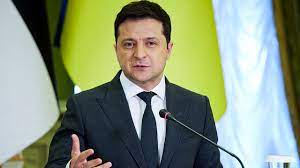Friday
On Wednesday, in his address to the people of Ukraine, president Volodymyr Zelenskyy made an allusion to a well-known Russian poem that should have shamed Vladimir Putin and those endorsing the Russian invasion of the country. Of course, we know that Putin is impervious to shame, but Zelenskyy’s allusion is still worth noting.
The poem was Yevgueni Yevtushenko’s “Do the Russians Want War?” Here’s how it showed up in Zelenskyy’s speech:
I know that they [the Russian state] won’t show my address on Russian TV, but Russian people have to see it. They need to know the truth, and the truth is that it is time to stop now, before it is too late. And if the Russian leaders don’t want to sit with us behind the table for the sake of peace, maybe they will sit behind the table with you. Do Russians want the war? I would like to know the answer. But the answer depends only on you, citizens of the Russian Federation
Yevtushenko wrote “Do the Russians Want War” in 1961 when the Cold War was at its height. The poem was meant to reassure the world that, while Russia would defend itself bravely if attacked, it had suffered so much from World War II (a staggering 16,825,000 Soviets died, which is to say 15% of the population) that it had no interest in attacking others. The poem became a popular song by Mark Bernes.
The reference to Elbe is when Soviet troops advancing from the east and American troops advancing from the west met at the Elbe River on April 25, 1945, thereby essentially cutting Germany in half. Many embraced. Elbe Day commemorates that encounter.
I share the song version, which may well have been the version Zelenskyy had in mind:
Do the Russians Want War?
Yevgueni Yevtushenko
Trans. by Leonard Lehrman
O, do the Russians long for war?
ask of the stillness evermore,
ask of the field, or ask the breeze,
and ask the birch and poplar trees.
Ask of the soldiers who now lie
beneath the birch trees and the sky,
and let their sons tell you once more
whether the Russians long,
whether the Russians long,
whether the Russians long for war.
Not only at their country’s call
did Russian soldiers fight and fall;
they died that men from ev’ry shore
might live without the fear of war.
Ask those who fought, and those erased,
ask those who at the Elbe you embraced.
These monuments are only for
to show if Russians long,
to show if Russians long,
to show if Russians long for war.
Yes, we can fight when fight we must;
but we don’t wish to breathe the dust
of soldiers brave from ev’ry clime
who give up life before their time.
Ask of the women in our life,
ask of our mothers –ask my wife–,
and you will never wonder more
whether the Russians long,
whether the Russians long,
whether the Russians long for war.
Their answer rises loud and clear
for all men, ev’rywhere, to hear.
The message now is as before:
the Russians do not long,
the Russians do not long,
the Russians do not long for war.
Because he doesn’t want to be seen as longing for war, Putin has been trying to raise the specter of World War II to justify his Ukraine invasion, pledging to oversee a “demilitarization and de-Nazification” of the country. His rationale, of course is absurd, as Zelenskyy has pointed out. (“You are told we are Nazis. But could a people who lost more than 8 million lives in the battle against Nazism support Nazism?”) Furthermore, Zelenskyy is Jewish and lost relatives in the Holocaust. The real threat Putin sees in Ukraine is not a military threat but a functioning democracy on his border, which threatens his own kleptocratic dictatorship.
There are reports of protests in Russia, which are occurring despite dire threats of reprisals. Which means that some Russians take Yevtushenko’s words seriously, even if Putin doesn’t.
